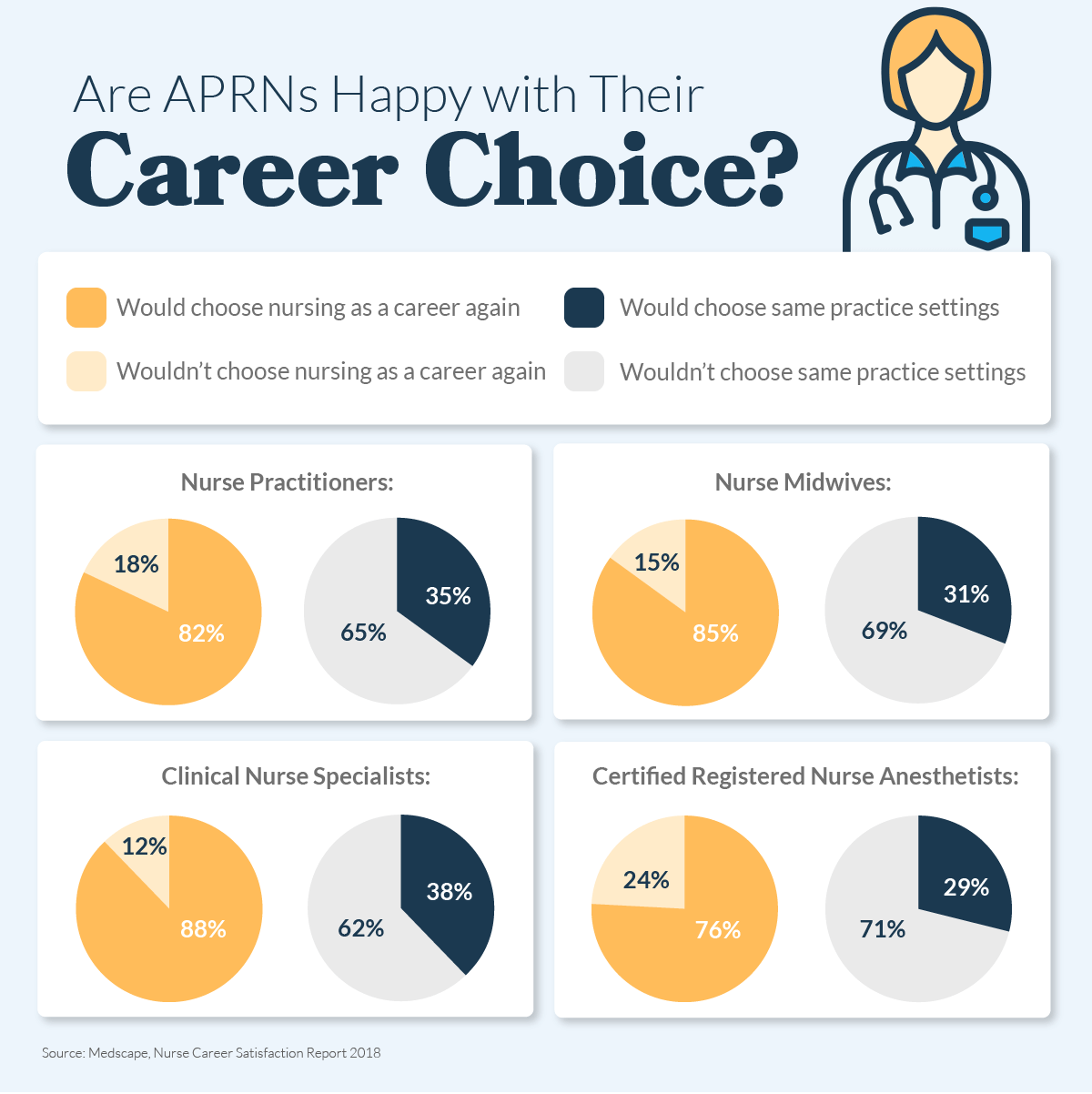When you ask if advanced practice registered nurses (APRN) are happy with their career choices, you hear a resounding “yes”. Of course, there are caveats like wanting more time with patients and fewer politics in the workplace, but by and large APRNs are happy with their career and given the chance, would choose it all over again.
Medscape conducted a survey recently, of 10,284 nurses that included APRNs. For the purposes of the survey, the APRN designation included the following nurse specialties:
- Nurse Practitioners
- Nurse Midwives
- Clinical Nurse Specialists
- Certified Registered Nurse Anesthetists
The majority of APRNs, 41-50%, said “helping people, making a difference in people’s lives” is what makes their job rewarding. They appear to be fully engaged in the profession, and in helping younger APRNs learn, as mentoring and developing the next generation of nurses were also named as benefits of the job. Like others, APRNs focus on the ability to have some work/life balance. When asked what is most rewarding in their jobs, these nurses said they look for job security, with the ability to work from home and options for telecommuting. Not all nurses can find those positions, but when they do they consider them to be some of the top benefits of the position.
Unlike many other professions, the vast number of APRNs expressed satisfaction with their career choice. Broken down by specialty, the rate of satisfaction looked like this:
- Nurse Practitioners: 96%
- Nurse Midwives: 98%
- Clinical Nurse Specialists: 98%
- Certified Registered Nurse Anesthetists: 98%
On the other hand, the greatest frustration expressed by APRNs was the inability to practice to the full extent of their “education, certification, and licensure”. This is a significant issue that goes to scope of practice issue and the limitations imposed on APRN practice. Many states require that an advanced level practitioner practice medicine under the supervision of a physician. The physician must sign off on basic orders like x-rays, prescriptions, referrals and other clinical matters. It is a thorn in the side of the APRN profession because it restricts the care they can provide. When practicing in underserved areas, these restrictions handcuff the APRNs ability to deliver comprehensive care to patients.
APRNs want to practice fully in order to best serve their patients; that was proven in Hawaii. In 2009 the state lifted restrictions on APRNs and allowed them to prescribe without a physician’s approval, open their own practices, be designated as a primary care provider and make referrals. What happened when they changed the law? The number of APRNs in the state nearly doubled; from 193 in 2009 to 383 in 2013.
The Medscape survey also highlighted one interesting fact regarding work satisfaction. APRNs that were happy with their choice of career were not necessarily happy with their choice of practice setting. Here’s a comparison of how each APRN specialty likes their career choice versus their career setting:
- Nurse practitioners: 82% would choose the career again, 35% said they would choose practice setting
- Nurse Midwives: 85% would choose the career again; 31% would choose same practice setting
- Clinical Nurse Specialists: 88% would choose the career again: 38% would choose same setting
- Certified Registered Nurse Anesthetists: 76% would choose the career again; 29% would choose same setting
It’s reassuring that the majority of APRNs are happy with their career choice. With the aging of the US population, we need all the skilled nurses we can get – and we need them to stay in their jobs; happy and well paid. That’s where the cracks in the pavement appear. The Medscape survey reported that “very few” APRN identified money as their main reason for satisfaction on the job.
Other surveys have found that money is a simmering issue.
- In 2013, The Journal for Nurse Practitioners published a study on nurse practitioners’ perceived beliefs and barriers to satisfaction. It found that the leading barriers were “reward opportunities, bonus availability and research involvement”.
- A PracticeMatch survey reported by Becker’s Hospital Review showed that “Signing bonuses have become more common in recent years, but still are not widespread — 14% of respondents with fewer than 10 years of experience received a signing bonus.”
We need advanced level practitioners, and we need them to be paid fairly. While few seem to be in it for the money, it may be important to take a long, hard look at salaries to ensure they are commensurate with skill and experience, before it moves from simmer to a full boil. We can’t afford to lose good people from the front lines of patient care.





